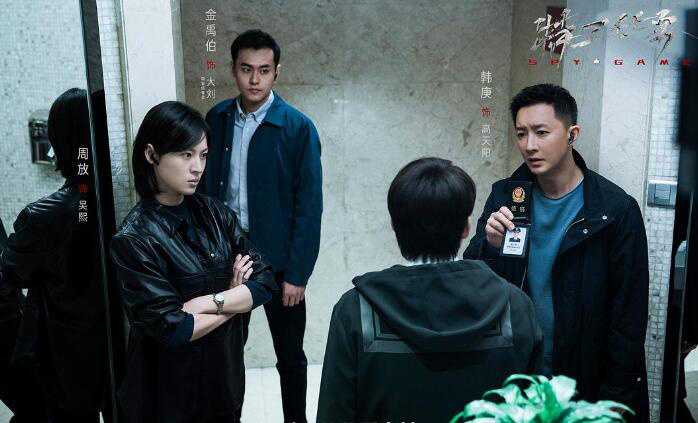
Wang Leehom and Jackie Chan "Hello brothers"
Leehom Wang

Jackie Chan

Actress Lin Peng

Wu Yue

Jia Qi, Deputy Director of the Movie Channel Program Center

group photo of the main creator
Movie Network News (Text/Xie Yawei, Photo/Yang Liu) On April 2, Jackie Chan’s new work "Young Soldier" held a media meeting in Beijing. Led by Jackie Chan, including director Ding Sheng, actors Wang Leehom, Liu Chengjun, Xu Dongmei, Lin Peng and other main creators made their first collective appearance. Jia Qi, deputy director of the film channel, also attended as a guest. Although the film has always maintained a very low-key attitude, on that day, Jackie Chan, the eldest brother, was quite interested. Not only did he sing a cappella on the spot, but he also broke out his nickname for his son Jaycee Chan – "Little House". He talked a lot of behind-the-scenes stories, and he liked to make fun of everyone.
"Young Soldier" tells the story of the Warring States Period, when an ordinary soldier captured a general and planned to take him back to his own country. On the way back, many interesting or tragic stories happened. Jackie Chan was the "soldier", and Wang Leehom played the "young general".
Jackie Chan abandons "small house"
Jackie Chan revealed that there were three candidates for the role of "Junior General": Jaycee, Daniel Wu, and Leehom Wang. At that time, his wife Lin Fengjiao strongly recommended that his son play the role, but Jackie Chan abandoned the Jaycee name, "’Little House’, Jaycee. If he played, the audience would just stare at him to see how he resembled me, and they couldn’t get into the movie at all. Wu Yanzu just worked with me on" Shinjuku Incident ", so Leehom Wang is the most suitable." Jackie Chan said that the three people’s image and temperament are quite similar. At this time, the host joked: "No, Jaycee’s eyes are not as big as Wang Leehom’s." The humorous Jackie Chan also pretended to be angry and confronted him, which attracted a lot of laughter from the audience.
Jackie Chan thinks Wang Leehom is "annoying"
"Young Soldier" is Wang Leehom’s second film since "Lust and Caution," and the talented singer is also outstanding in performance. "Ten years ago, I saw him play the piano, violin, erhu, drums, and speak English, Mandarin, and Cantonese. I thought, how can this person know anything?" Jackie Chan and Wang Leehom have known each other for ten years, saying that if he were a girl, he would definitely fall in love with him. The eldest brother is full of praise for Wang Leehom, but when it comes to singing, he calls him "very annoying". "After I captured him in the film, I was very happy and sang the hometown tune. He always beat me behind me and corrected the rhythm. I couldn’t sing well. It was really annoying." After the joke, Jackie Chan hung his throat a few times and sang the "hometown tune" at the scene. This time, Wang Leehom didn’t dare to make trouble.
Xu Dongmei "Strong Kiss" Wang Leehom
Jackie Chan’s female disciple Xu Dongmei plays a strong woman in the film, with a wild and unrestrained personality, similar to her own personality and temperament. Xu Dongmei’s first scene in the crew turned out to be kissing Wang Leehom. Talking about this matter, the fledgling she was a little embarrassed: "I love face very much. When I was told to kiss Wang Leehom, although I still acted cool and relaxed, I was already very nervous."
The film’s other female lead, Lin Peng, who played a teacher at the opening ceremony of the Beijing Olympics, described her joining as a dream, while Jackie Chan said it was "purely accidental." "Lin Peng walked past me in the corridor of the Olympic venues, and I just thought, isn’t she that character?" In this way, "teacher" Lin Peng turned into "gentle woman" and had an emotional entanglement with Wang Leehom.
Big brother and Ding Sheng, fellow villagers meet fellow villagers
Jackie Chan and Ding Sheng have worked together on four commercials, and it was the collaboration that made Jackie Chan fall in love with the young director many years ago. "I saw Ding Sheng’s work status on the scene at that time. He has a very clear idea and strong ability. Maybe because he is from Shandong, his personality is also very similar to mine, and I admire him very much." Jackie Chan said that he has been shooting movies for decades, and just by looking at the director’s work status on the scene, you can know whether he has real skills. "As soon as an expert makes a move, you will know if there is any." In a hurry, Jackie Chan burst into Cantonese. "This is the first time I have used a mainland team to shoot my own film. As the boss, I asked them to stop and rest four times. They are really dedicated." Jackie Chan said that in the near future, he will work with Ding Sheng again.
At the scene, Jackie Chan’s disciple "New Seven Xiaofu" performed the theme song of "Little Soldier", which made people’s eyes shine with cool costumes and dances with martial arts movements. Director Ding Sheng revealed that the film has been shooting in Yunnan since it started shooting on February 3, and is now in Beijing. There are still three days to complete the pre-shooting.
Next page: More wonderful pictures of the press conference
[Movie Network]www.1905.comExclusive manuscript, please indicate the source when reprinting.

